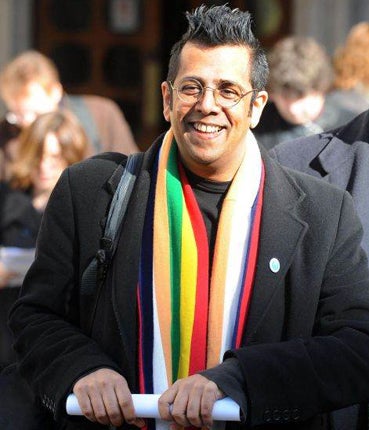Writer's victory over 'Orwellian' libel laws
Science journalist wins lengthy court battle against chiropractic association

The science writer Simon Singh has won a victory for freedom of speech in his cause célèbre libel battle with the body that represents Britain's chiropractors.
In a landmark ruling yesterday, three law lords found that Dr Singh should have the right to rely on the defence of "fair comment" in defending a libel action brought against him by the British Chiropractic Association (BCA). The BCA is suing the writer over a newspaper article in which he argued that there was a lack of evidence for claims some chiropractors make on treating certain childhood conditions including colic and asthma. The association said its leaders had been accused of knowingly supporting "bogus" treatments.
In May last year, the High Court judge Mr Justice Eady held that Dr Singh's comments, published in The Guardian, were factual assertions, rather than opinions, and so the writer should not be allowed to rely on the libel defence of fair comment. Yesterday the Lord Chief Justice, Lord Judge, sitting with the Master of the Rolls Lord Neuberger and Lord Justice Sedley found that Mr Justice Eady had erred and that Dr Singh's words "however one represents or paraphrases their meaning, are, in our judgment, expressions of opinion".
The Lord Chief Justice said that allowing a complainant to force a writer to prove their views would take the justice system in the direction of the society depicted in George Orwell's 1984. "The opinion may be mistaken, but to allow the party which has been denounced on the basis of it to compel its author to prove in court what he has asserted by way of argument is to invite the court to become an Orwellian ministry of truth."
The existing system has recently been criticised by parliament committees and Jack Straw, the Justice Secretary, said yesterday that he was determined to cut the size of "no win no fee" deals used by libel lawyers before the general election. American coverage of the Singh case last night made reference to the writer having "chipped away at the country's harsh libel laws".
Tracey Brown, spokeswoman for the Coalition for Libel Reform, said: "We are delighted with the judges' ruling but it does not go far enough." She referred to other science-related libel actions including that of a cardiologist being sued by a device manufacturer and scientific researchers who cannot publish a critique of lie detector technology because of the threat of a writ.
After yesterday's ruling, Dr Singh said there was an urgent need for reform of the law. "I'm still very much concerned with English libel law regardless of the fact that it went in favour of me today. I think the most senior judges in the country are worried about it too," he said. "I'm guilty until I can prove myself innocent, unlike any other area of English law. We don't want to get rid of libel but if you are saying things that are reasonable, fair and in the public interest we should encourage that rather than try to shut down debate."
Due to the sums involved, defending a libel action has become like "a high-stakes poker game", he said, and the sensible response to a writ was to back down and apologise. "I'm slightly mad and so that's not what I did. It has still cost me two years of life. It's not been fun but I'm not prepared to hang on an article that I still believe to be fair and accurate and true." Dr Singh estimates the cost of the case, so far, at £200,000. "Now it's up to the BCA, the ball is in their court," he said.
Richard Brown, the BCA president, said the association had brought the case to "uphold its good name" and was considering an appeal to the Supreme Court.
Join our commenting forum
Join thought-provoking conversations, follow other Independent readers and see their replies
Comments
Bookmark popover
Removed from bookmarks